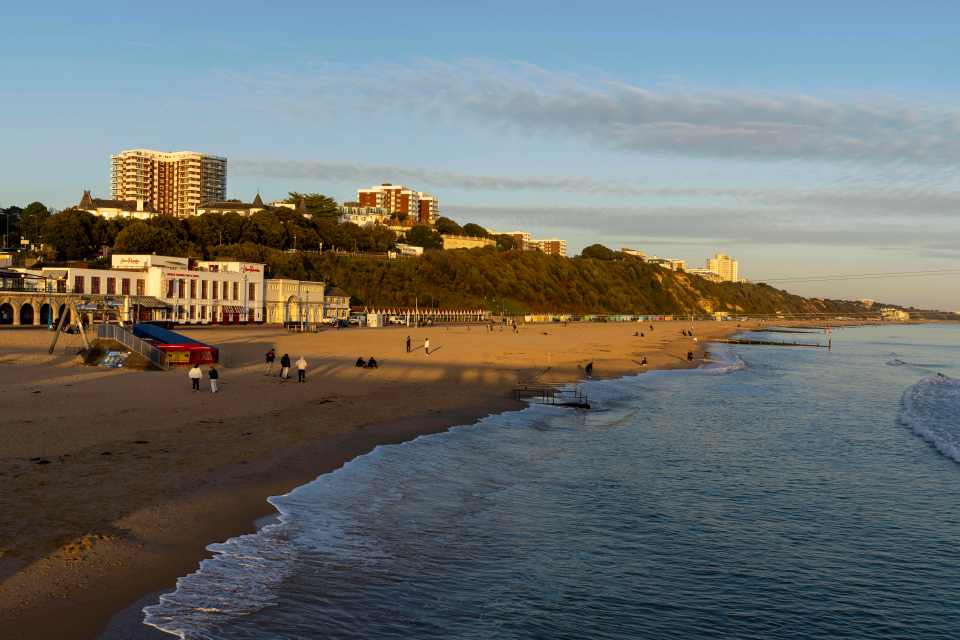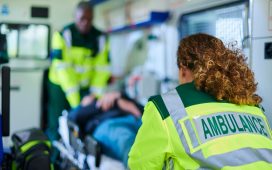WITH its vast golden beaches, historical architecture and picturesque gardens, Bournemouth attracts millions of tourists each year.
As well as being a summer destination, the town, on the southern edge of the picturesque county of Dorset, is a hive of activity in the winter, with its promenades set to welcome Christmas tree stalls, ice rinks and buzzing winter wonderlands.
But beneath the festive glow lies an uncomfortable truth.
Bournemouth has the highest number of rough sleepers in the UK outside of London, with many facing new dangers from the rise of ‘Frankenstein’ drugs sweeping the nation.
Some 65 people lost their lives in the town – darkly dubbed the ‘drugs capital of the South’ – to overdoses this year alone, compared to 34 last year, according to recent data from the Office for National Statistics.
And those who have braved life on the street attribute the shocking spike to the emergence of man-made nitazenes – synthetic drugs cooked up in sinister Chinese labs, which are increasingly being cut with dangerous substances including heroin and cocaine.
As one Big Issue seller, Karl Burnes, tells The Sun: “I see a lot of drugs abuse and I know quite a few people who’ve died because it’s mixed with stuff.
“Sometimes I’ll be sitting here, and someone will come along and say ‘what’s-his-name’s just died’ – it’s horrible. It’s really sad.
“I know of six or seven in the past few weeks.
“People know drugs are being mixed, but they’re addicts, so they take it even though it could be mixed with fentanyl or with nitazenes. They need support to get off the drugs.”
Just six miles away, in the same district of Bournemouth, Christchurch and Pool (BCP), is the millionaire’s playground of Sandbanks, where properties average £1.2million.
It is home to musician and actor George Bruno Money, former Stoke City manager Tony Pulis, football pundit Graeme Souness and TV presenter and interior designer to the stars Celia Sawyer.
In 2022 official government figures showed 64 people were sleeping rough in the BCP area, the third highest level in the country, only behind Camden and Westminster.
Today that figure is believed to be at least 72, many of them substance abusers.
Many will take their tents, sleeping bags and meagre belongings to a park, beach or underpass to shelter from the cold winter weather.
In September, the issue came to a head when a group of homeless campers set up a ‘shanty town’ on the beach, sparking concern with residents and local authorities.
Danger drug
MPs from all sides have called for action to address the national drugs death crisis, caused by the market being flooded by nitazenes.
The powerful synthetic opioid, which is 50 times more powerful than fentanyl, has been linked to 230 UK deaths between June 2023 and June this year.
Karl, 56, has witnessed first-hand the horrors risked by addicts.
The local resident became homeless when he split up with his partner in 2018.
He had been homeless for seven months when another rough sleeper dragged him to the floor and kicked him repeatedly in the head in a vicious, unprovoked attack.
Big Issue seller Karl was left with life-threatening injuries including nine fractures to his skull, shattered teeth and multiple brain bleeds.
He says paramedics declared him dead at the scene, but miraculously saved him. He was airlifted to hospital and the mother of his two children was called to the hospital to say goodbye.
But against all odds he survived. After months in hospital healing from his injuries and learning to walk, talk and swallow again, Karl was housed on his release.
And he’s now turned his life around. He sells the Big Issue and supplies copies for other vendors to sell, regularly chatting to Paul Gasciogne, who lives nearby.
Because he has accommodation, he sees his young teenage children twice a week, but realises he is one of he is one of the lucky ones.
“I know most of the homeless people here and they are good as gold,” says Karl.
“There needs to be more accommodation for rough sleepers and more support.
“There used to be a homeless shelter in the town where you could pay about £3 and get a bed, breakfast and an evening meal. Now there isn’t one.
“I hope Bournemouth gets back to how it used to be. It was a nice place to visit but with the shops closing and these issues a lot needs to done.”
Drugs are more readily available than ever. The death rate is because of the nitazenes which drugs are being laced with
Scott Harding, 43, was left homeless for four months in the summer, after his father became ill and they lost their home.
He told The Sun: “I wasn’t homeless by choice or through addiction or any substance abuse, but I met many good people who were.
“I witnessed someone overdosing when I was living in a tent on the beach. Thankfully the paramedics arrived in quick time, it was an extremely scary and tragic experience, and it certainly drove home to me just how serious the issue is.
“I’ve noticed that in Bournemouth and in Boscombe the town has been blighted by drugs, be that heroin or cocaine and some of the more modern offshoots that are springing up.
“Even heroin is being infused and synthetically altered, so some of the men and women who are addicted are not even sure or aware what they’re taking, which compounds the misery and has a knock-on effect to everybody else, the NHS included.
“I’ve been on a tumultuous journey, I’ve endured a distinct lack of systemic support. It’s organisations like We Are Humans and other organisations connected to the church which have retained my sense of hope and faith.
“If it wasn’t for those organisations who knows where I would be.”
Even heroin is being infused and synthetically altered, so some of the men and women who are addicted are not even sure or aware what they’re taking
Andy Talbot is the founder of We Are Humans, predominantly a homeless charity, which also runs a mums and kids breakfast club and a pensioner’s luncheon club.
The charity operates from a small café on Sea Road, where it hands out bread, blankets, tents and sleeping bags to the deprived and homeless in the area.
He says: “More than 20 years ago I became homeless when my family broke down, and thumbed a lift on the M6.
“The driver was going to Bournemouth, which is how I ended up here. I was homeless for a long time and sold the Big Issue, so I saved up and got myself a bedsit.
“I used to go to the reduced aisle and buy sandwiches and vegetables, knock up a soup and go and feed homeless people because I knew what it was like to be homeless and alone.
“I wanted to save lives and make that discomfort a bit easier.”
Saving lives
Now Andy dedicates his life to helping people who’ve found themselves impoverished and with nowhere to sleep but on the streets.
When he’s not volunteering at We Are Humans, he works as an events worker, donating his wage to the charity he launched two years ago.
He also works as a property manager for three blocks of bedsits, and through that role has helped home 77 people.
But, despite his efforts, Bournemouth remains in the grip of a rough-sleeping crisis.
He says: “We are living in the fourth most deprived area in the UK, 51 per cent are deprived and 49 per cent are very affluent.”
He adds: “This year 65 people in the BCP area have died of drugs, and the year isn’t over.
“Drugs are more readily available than ever. The death rate is because of the nitazenes which drugs are being laced with. Drug addicts are basically playing Russian roulette with their lives.
“I’ve seen people overdose and been given the anti-overdose shot four times, before going back down.
“The drugs are mostly a side-effect of homelessness.
“They hold down a job to start, and then lose it when they get dragged further into the mire, and with mental illness which often goes alongside these issues, it’s a vicious circle.
“We need more rehab facilities for people to help them become valued members of society.”
Kevin Strudwick is the Business Crime Operations Manager for Bournemouth’s bustling town centre.
He runs a team of seven enforcement officers, employed to deal with anti-social behaviour in Bournemouth.
He explains: “We obviously do have many homeless people and rough sleepers in the town who create problems with anti-social behaviour, drunkenness and sleeping in shop doorways.
“The officers will come round, wake them up, give them advice and tell them where to go for support.
“It’s got a lot worse, a lot of people come from other areas. If you’re on the street you might as well come to Bournemouth because it’s a seaside town, it’s a holiday destination and so people tend to be more generous.
“In the summer we had a shanty town on the beach, there were tents going all the way along and enforcement had to get them to move on.
“It is a problem and there is help there and accommodation, but they must obey the rules, like no drinking, smoking, drug-taking or fighting.
“You can speak to tourists who say the town’s gone downhill, and they wouldn’t come back again, and local people will say they don’t come into town any more.
What are nitazenes?
IT’S a synthetic opioid that is up to 500 time more powerful than heroin and “a speck of dust” sized amount can kill.
Nitazenes are a worrying new compound that is being added to heroin and other drugs, including counterfeit medication sold online.
The synthetic opioid can produce sedation and euphoria but also fatal respiratory depression.
Nitazenes have claimed more than 100 lives since last summer in the UK alone, according to the National Crime Agency.
There are many types of nitazenes – currently 14 have become Class A drugs on Wednesday under the Misuse of Drugs Act.
According to medical journal The Lancet, etonitazene has a potency of 500 compared to heroin, which was rated at one and fentanyl, listed as 50.
The drug was originally manufactured by the pharmaceutical industry in the 1950s and 1960s as a pain-relief medication and anaesthesia.
However, they discovered to be so potent that they were never approved or marketed as a medicine.
Since 2019, nitazenes have re-emerged within illegal drug supplies in the UK as well as the US and other European countries.
“We get targeted with London drug gangs and county lines drug gangs which the police are tackling and trying to find out who these people are, but the side effect is that there are deaths, which is very sad.
“We notice certain people aren’t on the streets any longer and you find out from someone like Karl, the Big Issue seller, that they’ve died.
“It’s horrible. They’re somebody’s son or somebody’s daughter and they’re vulnerable, so someone will get attached to them, supply them with the drugs and before you know it it’s out of control and unfortunately, they die.
“Having said all that, the police have been campaigning hard, Bournemouth is still a fantastic place to come for your holidays and has had a lot of investment recently.
“The old House of Fraser is being developed into apartments so people who move in can use the cafes and bars and make it more vibrant.”
In the summer we had a shanty town on the beach, there were tents going all the way along and enforcement had to get them to move on
David Allen, 85, is a local resident who thinks the Government should do more to address the issues faced by the town.
He says: “Invariably I see people sleeping in doorways or under some form of shelter.
“The question is where these people can be moved to. It’s a good thing if the homeless can find a better way of living, they’re human beings and people might have mental deficiencies, in which case that should be taken into account.
“From what I’ve read in the papers it seems Bournemouth is one of the worst affected areas when it comes to drugs death figures.
“Considering it’s supposed to be a fairly affluent area in relation to other large areas it’s a pity the local authorities don’t have some form of sympathy in order to assist.”
Cllr Kieron Wilson, Portfolio Holder for Housing and Regulatory Services at BCP Council, said: “The Bournemouth, Christchurch and Poole Street Outreach Service (BCPSOS) team are undertaking additional shifts during SWEP to encourage everyone rough sleeping, including those who are reluctant, to take up the offer of temporary accommodation.
“After deactivation, the council and its partners will continue to support individuals into a range of long-term housing solutions.
“Last year, 33 people benefited from this approach, reinforcing SWEP’s potential to permanently help people off the streets.”



















